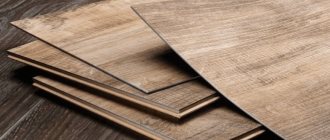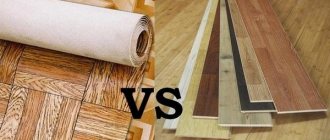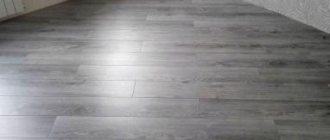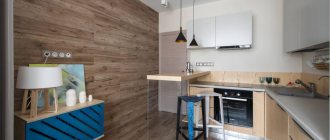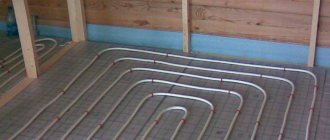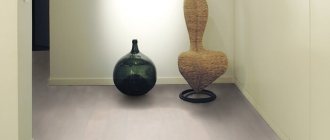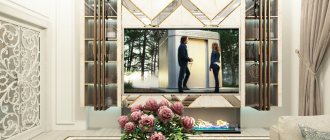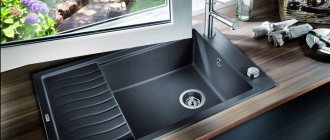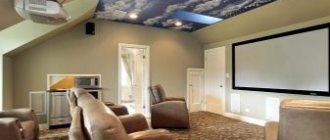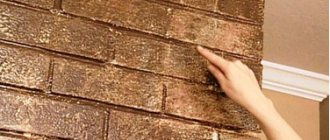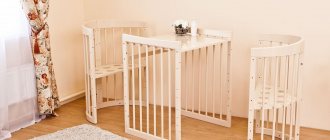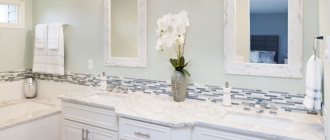Vinyl flooring is a relatively new type of finishing material, but with an impeccable reputation. The characteristics of vinyl combine the advantages and lack the disadvantages of laminate, wood and linoleum. It is able to withstand friction, heavy furniture and floods, therefore it is used in the design of offices, retail premises, medical institutions, etc.
To choose from: FineFloor quartz-vinyl tiles, Decoria, Holzplast interlocking tiles, Corkstyle vinyl laminate, Step Click eight-layer vinyl flooring, products from flooring masters - Wicanders, IVC Moduleo, Tarkett Art Vinyl, etc.
Vinyl flooring: varieties
- Self-adhesive tiles. Produced with a layer of glue under a layer of paper. All that remains is to remove the protective paper and, rolling it with a roller, glue the entire area of the coating to the base;
- Rolled fabric. Also stationary view. It is completely glued; special glue is used to fix the canvas;
- Tiles with locks on self-adhesive tape. Unlike the previous product, it is glued only along special protrusions on both sides of the tile;
- Vinyl cover with lock joint. Installed similarly to laminate, it is used in places where high wear resistance is required.
TOP 5 vinyl flooring manufacturers
- TARKETT (Russia) – the Art Vinyl series includes 3 designer lines with imitation wood, stone and ceramics. The company produces square tiles and laminate-like sheets.
- ALLURE FLOOR (USA) – quartz-vinyl laminate and covering in tile format. A large assortment of wood imitations: pine, oak, ash, maple, cherry, walnut, etc. There are self-adhesive types and products with a mechanical lock.
- QUICK-STEP (Belgium) - presents vinyl laminate in three series: Ambient Click (locking type, class 32), Livyn Balance Click (adhesive locks, classes 32 and 42), and Livyn Pulse Click (locking type, classes 32 / 42).
- ART TILE (South Korea) – quartz-vinyl tiles and laminate with a wide selection of textures. Fixation is adhesive and locking; free-standing models are also available. Wear resistance of the highest class 43.
- BOLON (Sweden) – rolled vinyl, square tiles and laminate with an original wicker texture. A leader in the production of woven vinyl flooring, the products are premium and adhesive-installed.
Modern vinyl for flooring is, in fact, an evolving linoleum: plastic, with more advanced performance characteristics, tolerant of high humidity, easy to clean and, for the most part, relatively inexpensive.
Views: 3,887
We also advise you to read:
Structure
Vinyl coating is divided into two groups - quartz vinyl and pressed PVC coating. Quartz vinyl tiles contain quartz sand (80% of the composition), vinyl and plasticizers. PVC tiles are layers pressed on top of each other. In the simplest version there are 4 such layers. A reinforcing layer (fiberglass) is placed on top of the base vinyl layer, then there is a decorative layer under a transparent protective coating (vinyl film). The layers of vinyl coating are joined by hot pressing.
Purpose of layers:
- The surface film prevents impacts, scratches, and signs of wear. The wear resistance class of floors depends on this layer;
- The pattern that determines the design and color of the coating is applied using heliogravure or screen printing technology;
- Pressed quartz chips and plasticizing additives make the material strong, tough, and elastic;
- The PVC backing (vinyl) stabilizes the tiles and neutralizes vibration, so you can walk on the vinyl floor completely silently.
What is vinyl laminate
Initially, a vinyl panel was produced, which was made of PVC, then quartz elements began to be used in production, which made it possible to improve the performance properties of the material. This is how vinyl laminate was born. The aesthetic properties of the material allow you to implement any design projects.
This material is a laminated tile. The products are otherwise called interlocking vinyl-based laminate. Today, thanks to the constant improvement of tile manufacturing technologies, this material has high moisture resistance.
What is the difference between standard laminate and vinyl? The coating has two main layers, the top one is made of aluminum oxide or polyurethane, which imitate natural materials - stones, leather, wood in three dimensions. It provides protective and decorative functions. The second layer is vinyl, the thickness is approximately 0.5 mm, but this is enough to provide excellent strength.
There are several types of vinyl laminate, their classification is carried out according to the following criteria: composition and installation method. The composition includes the following types of material:
- Quartz vinyl laminate. This coating is distinguished by the fact that the tile contains up to 80 percent quartz; it is located between the top and bottom layers. This component ensures the special hardness of products. Reinforcing the surface with fiberglass is a special procedure that allows for high wear resistance of the laminate. The top layer is polyurethane, the material is made by hot pressing, which ensures its complete safety during operation;
- Vinyl-PVC - these products have an additional protective layer of polyvinyl chloride, which provides high strength characteristics. It protects against mechanical damage and other influences.
Advantages of vinyl coverings
Strength. Vinyl is chosen for its wear resistance and durability. It is plastic, not afraid of loads, heels, impacts and friction, does not paint or crack. It is important that fragments damaged during operation can be removed and replaced. In this regard, tile material is more profitable than sheet material.
Moisture resistance. Quartz-vinyl tiles are invulnerable to water, and the threat of leaks is minimal. This allows you to use vinyl flooring in the bathroom, toilet, and kitchen.
Easy care. Maintaining this floor is easy. Simply sweep away the debris and then wash with a wet mop. Appropriate cleaning compounds are used to remove contaminants.
Quick styling. Vinyl flooring is even laid on top of old floors - concrete, wood, or tile. The main thing is that there are no significant differences in height and protruding nails.
Durability. A properly assembled vinyl floor lasts 10-20 years; the service life directly depends on the quality of the material, the installation method and the characteristics of the room.
Aesthetics. The decorative properties of the material are excellent. Vinyl floors create exquisite beauty, and in terms of the richness of colors and patterns they have no equal. Among the popular models are printed tiles decorated with wood, marble, granite, terracotta and other materials with various shades, textures and textures.
Comfort. Regardless of the type of surface (it can be smooth or rough, matte or glossy), vinyl seems soft and resilient. It is pleasant to walk on such flooring, in addition, they remain warm in winter.
Vinyl Flooring Manufacturers
Manufacturers of various vinyl coverings from several countries present their products on the Russian market. To choose guaranteed high-quality durable materials, it is recommended to pay attention to certified products produced under strict quality control and compliance with strict safety standards. Such manufacturers have managed to win the recognition of Russian consumers.
As a rule, leading companies produce a considerable range of coatings of different types and different wear resistance classes.
- "TARKETT" is a company with French roots (its history dates back to the end of the 19th century!), whose products are in great demand all over the world. One of the largest branches is located in Russia, specializing specifically in PVC coatings (Otradny, Samara region).
The company's product range includes a wide selection of ART VINYL vinyl coverings - a lot of collections with a wide variety of sizes, shapes and shades.
Art Vinyl Cosmic Moon
- "Berry Alloc" and "Vinilam" are famous Belgian companies that supply their products all over the world and have many fans in Russia.
Belgian vinyl tiles. Model “Ash Lime” with adhesive lock
- “Vinyl Boden” is a German manufacturer, and as you know, German quality always attracts numerous buyers.
Vinyl-Boden 6038-6
- "ALLURE" is an American company that necessarily accompanies its products with hygiene certificates. The products are distinguished by their quality and consistently high demand.
- "Bolon" - a Swedish company has also long been engaged in the production of vinyl materials, which are manufactured according to strict European Union standards. Very interesting tiles that create an imitation of a wicker surface.
"Woven vinyl" produced in Sweden
Of course, products from other companies are also offered. There are also many offers from eastern online stores. Therefore, before purchasing, it always makes sense to take an hour to find and carefully study consumer reviews about the coating you like.
Disadvantages of Vinyl Flooring
Despite the impressive list of advantages, vinyl flooring is not 100% flawless. Durable, affordable and beautiful, it still has certain disadvantages. And the most obvious of them relates to the impact on the environment. Plasticizers and stabilizers in the composition do not make vinyl floors environmentally friendly and 100% natural materials. Vinyl does not rot, but its natural destruction takes a lot of time. In addition, it is rarely recycled.
Other features:
- Insulation. Thin vinyl tiles are almost often additionally insulated, which increases costs;
- Softness. Vinyl can suffer a lot of wear and tear if it is laid over a defective subfloor. It is better to level the base to avoid scuffs and damage to the coating;
- Toxicity. Materials in quartz vinyl tiles sometimes release toxic compounds. This can cause irritation to the eyes and respiratory system. The main degassing occurs immediately after the deck is assembled;
- Color. Vinyl is susceptible to chemical pigmentation and can change color - for example, by reacting with rubber. Rugs and soles can, over time, trigger a chemical reaction that will result in discoloration of certain areas of the floor. Poor quality material can turn yellow when exposed to sunlight or pollution. To avoid such surprises, you should choose high quality products.
Return to list
Vinyl flooring forms
Vinyl flooring is sold as parquet, tile, and long sheets that resemble slats.
- Rolled vinyl is a kind of analogue of linoleum. It has a two-, three-, and more rarely four-meter width and is sold by the meter. It is glued to the base of the floor with acrylic glue, and the seams, for reliability, are treated with hot welding.
- Square PVC tiles skillfully imitate natural stone and ceramics. They are quite expensive, but the quality is not satisfactory: “hardened” vinyl is impervious to caustic chemicals, since it has a denser protective layer and a quartz content of 75 percent. The standard size of products is 30 by 60 centimeters, but there are exceptions.
- Elongated sheets of vinyl imitate the popular laminated board, for which they are often called vinyl laminate. Like the prototype, the planks are placed on a special backing - felt or fiberglass, in most cases they have a self-adhesive backing (a huge help, since you don’t have to look for glue approved by the manufacturer). This format cannot be called cheap, but the costs are more than offset by the simplicity and speed of installation. The average dimensions of the sheet are 18 by 92 cm (you can also find a 10x92 format), thickness is about 1.5-2 millimeters, sometimes up to 3.5.
Depending on the area of application, vinyl coatings are divided into:
- Household - classes from 23 to 31 . Suitable for rooms in residential buildings and other low-traffic areas. They serve for about five years.
- Commercial - classes from 32 to 42 . They get a compacted protective layer and, accordingly, are more durable. They can be purchased for social institutions; they will last at home for at least ten years.
- The specialty vinyl represents the 43rd grade . The coating is as strong and resilient as possible, designed to withstand heavy mechanical loads, and prevents slipping and damage from impacts. The predicted period of operation is from 15 to 20 years.
The texture of vinyl flooring can be smooth or textured. Rough material is preferred in public organizations, where it is especially important to prevent slipping. The colors come in both matte and glossy.
Installing vinyl, regardless of its type, is not difficult at all. As the golden rule of installation says, the floor must be level - even small local differences can disrupt the structure of the flexible and thin vinyl covering. The screed or wood must be thoroughly cleaned and degreased, then glue is distributed (if there is a need for it, there is a complete self-adhesive, as well as a locking type of connection with fragments of adhesive tape), and the material adheres to the surface. The glue hardens in about fifteen minutes; Until this time has elapsed, the position of the vinyl tiles can be adjusted. You can move on the fresh flooring immediately; it is recommended to arrange furniture after 2-5 days.
There are no special care requirements. Vinyl is not afraid of water and solutions with mild chemical cleaners, but in order not to accidentally spoil its aesthetic appearance, it makes sense to refuse to use coarse abrasives and brushes with stiff bristles. If you need to add gloss, the elastic floor can be treated with linoleum mastic.
Rigid Vinyl Tiles
SPC
► Select SPC laminate in the catalog.
SPC-based flooring is a new generation and the most advanced type of vinyl flooring. The base is SPC (Stone Polymer Composite), a monolithic slab with a density of 2000 kg/m3, consisting of 80% calcium carbonate and 20% polyvinyl chloride. Such a simple combination of components gives an amazing result: SPC laminate is stable under changes in humidity levels, impact-resistant, and has optimal thermal conductivity for effective heating applications.
Benefits of SPC:
✔ Warm floor with heating up to 40°C. Linear expansion when heated tends to zero, and the optimal thermal conductivity of 0.20-0.25 W/(m K) ensures rapid heating of the surface and minimal heat loss.
✔ Threshold-free installation up to 500 m2. Quartz vinyl tiles can be laid without breaks up to 100 m2, but SPC laminate with a rigid structure is much more stable, so the tolerance is increased 5 times!
✔ Laying on various substrates. Not only on perfectly smooth concrete screeds, but also on wood, old tiles, linoleum. Base differences of up to 5 mm per 2 running meters are allowed.
Conditional disadvantages of SPC:
- Requires underlay. If abrasive gets under the floor during installation, it can cause squeaks in hard floorboards, so it is recommended to use a backing during installation if such a layer is not provided in the structure (Vinilam Ceramo, Art Stone, Alpine Floor).
- Only the castle type. SPC laminate is made with glueless locks, which are a continuation of the mineral board, creating very strong connections. However, if the adhesive option is chosen, then this is not available in the SPC assortment.
Rigid Vinyl
► Select Rigid vinyl flooring from the catalogue.
In terms of density and elasticity, Rigid Vinyl is a cross between SPC and quartz vinyl tiles: the base is essentially a thickened layer of polyvinyl chloride with additives. Density 900-1000 kg/m3: 2 times less than SPC, but 3 times higher than the value for quartzvinyl. Thanks to this, Rigid Vinyl is less demanding on the base, but at the same time the heating of the heated floor is still limited - up to 28°C. In addition, Rigid can be laid without thresholds over an area of up to 400 m2 and used in unheated rooms.
WPC
► Select vinyl WPC floors in the catalog.
WPC (Wood Polymer Composite) tiles are very similar to SPC, but since the base is dominated by wood flour and the foaming agent, the flooring is less stable: an additional PVC layer is required. As a result, the structure is as complex as that of quartz vinyl, and the only advantage is the possibility of installation on less prepared substrates. In addition, WPC does not require a substrate.
There remains a restriction on heating underfloor heating (heat loss for WPC is significantly higher than for other types of vinyl tiles). Like SPC, WPC floors are only available in the interlocking type.
We invite you to the Polov salons in Moscow and Odintsovo: see samples of all types of vinyl floors, ask related questions to the managers, order accurate delivery!
Briefly about vinyl floors
All types of PVC tiles have class advantages:
- 100% waterproof . Quartz vinyl can withstand changes in humidity and temperature, as well as direct, prolonged contact with water.
- Wear resistance . The top polyurethane layer protects the floor covering from abrasive wear, as well as from destruction of the structure.
- Stability . The plates maintain stability of linear dimensions in any operating conditions (indoors).
- Decorative value . A huge variety of realistic wood and natural stone decors with embossing on the top layer.
- Impact resistance . Falling heavy objects do not harm the PVC floor covering.
- Warm surface . Thanks to optimal thermal conductivity, vinyl tiles are never cold and take on the temperature in the room.
- Compatible with heated floors . PVC tiles are compatible with all types of heated floors, but with restrictions on surface heating (tolerances depend on the types of vinyl coverings).
Types of Vinyl Laminate Flooring
Installation methods for vinyl laminate flooring vary. There is a self-adhesive material, the lower adhesive part of which is protected by paper. It should be removed before installation. This is the simplest installation method that does not require special experience or skills. Each plate is completely glued to the surface.
Another type is adhesive based. It also sticks to the surface, but in this case a special adhesive composition and a hair dryer are used for drying. The material fits very tightly, and in the future this ensures convenient use. This floor is not afraid of either water or mechanical stress. The downside is that if an individual floor element is damaged, it cannot be replaced, so adhesive-based vinyl laminate is not particularly popular.
Adhesive-based materials are usually produced in rolls . Its installation is considered labor-intensive; air bubbles are constantly formed during installation, which must be removed. In addition, the adhesive is quite expensive, which increases the overall cost of creating floors.
Currently, the most in demand is quartz-vinyl laminate with locks. These modern products are equipped with special locks that allow the elements to be fastened to each other. Plywood, linoleum or tiles can be used as a base for the coating.
The convenience lies in the fact that such a floor can be repeatedly assembled and disassembled. The plates have a click lock or latch. This option is considered the most reliable, since the locks allow individual lamellas to be well fixed at the joints. Installation is simple, and the coating is beautiful and high quality.
